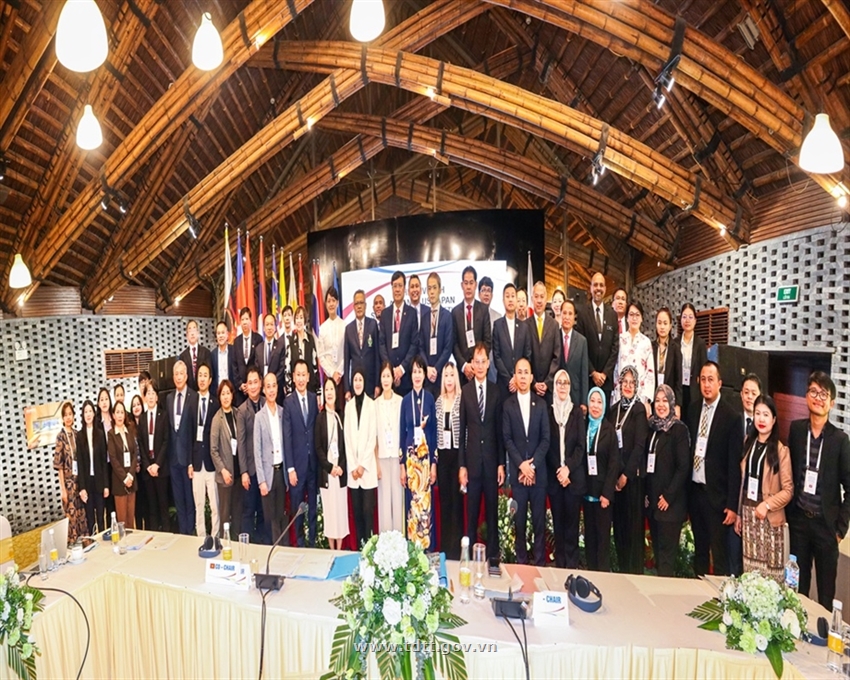Director of the Sports Authority of Vietnam (SAV) Dang Ha Viet and Division Director of the International Affairs under Ministry of Education, Culture, Sports, Science and Technology of Japan Yuji Kakizawa co-chaired the SOMS-Japan event.
Among the mentioned issues were women and sports, physical education and sports for people with disabilities, sports for sustainable development, programmes to improve physical education and sports for people with disabilities, gender equality in sports, and football and community development.
Speaking at the event, Kakizawa affirmed the importance and values of the comprehensive strategic partnership which included sports between ASEAN and Japan. Two sides currently maintained a dynamic, substantive and effective relationship in sports development coordination.
Japan have strived to promote the improvement of physical education capacity, improve the quality of life, gender equality and share experiences in Southeast Asia with specific programmes.
Kakizawa hoped to receive many initiatives and opinions contributing to ASEAN-Japan’s further development in the coming time.
At the working session, the ASEAN Secretariat reported about programmes which have been carried out following the sixth SOMS-Japan held on August 30, 2023 and the ASEAN Ministerial Meeting on Sports (AMMS)-Japan organised on September 1, 2023; and ASEAN-Japan’s Action Plan on Sports: Policy for development and capacity building in professional sports in ASEAN member countries.
Meanwhile Japanese delegates updated the current status and future orientation of the ASEAN-Japan cooperation on sports.
At the conference, attendees recorded information and exchanged opinions on a range of issues that needed more attention of ASEAN member countries such as women and sports, physical education and sports for people with disabilities, and sports for sustainable development.
Among these issues, the gender equality for girls and women lured the attention of many delegates. This programme has been implementing from 2021 by Japan which will develop specific criteria for each country in ASEAN.

Deputy Director of the International Research Centre for Sport and Gender Equality (Seijo University - Japan) Aya Noguchi said sport was a strong foundation to promote gender equality and empower women and girls. Gender equality also helped eliminate violence and harassment in sports and lift the important role of female athletes in supporting sports diplomacy.
Japan wanted to receive ASEAN countries’ initiatives, indicators, criteria and targets for post-career education and training programmes so that they could build a databank in each country to promote strongly gender equality in sports.
Agreeing with Noguchi, Head of Vietnam delegation and SAV Deputy Director Le Thi Hoang Yen said Vietnamese sport has developed many programmes and activities to appeal social interest and media support for female athletes. Many enterprises and social organisations have been actively participating in sponsoring and creating post-career job opportunities for this group of sport people.
Yen said Vietnam would coordinate with Japan to organise a workshop on physical education and sports for people with disabilities in February 2025 in Hanoi and hoped that all countries would participate to promote the above projects.
In conclusion, the SOMS-Japan agreed on a number of issues such as having strong commitment and support to promote gender integration into sports policy; considering the possibility of integrating gender equality into any sports policies, initiatives and budget allocations of every ASEAN member state; welcoming every country to host workshops on capacity development in the future; cooperating closely with each other to carry out national researches; exploring the possibility of identifying common AMS gender equality indexes and sharing data during the SOMS-Japan conference.
Delegates also set goals to implement in the period of 2023-26. Each country will develop an on-site policy/work plan with the integration of gender equality; identify its own indicators to measure the progress of gender equality in and through sport; actively popularise the benefits and challenges for women and girls of participating in sport and physical training in relation to diverse cultural contexts; promote AMS initiatives globally as a typical research of an Asian country; and connect global resources with AMS to promote gender equality.
On October 16, Vietnam will continue to host the SOMS-China conference where delegate will discuss key issues including the exchange and revival of traditional sports and games as intangible cultural heritage./.
Thanh Ha